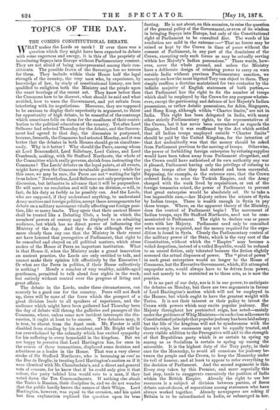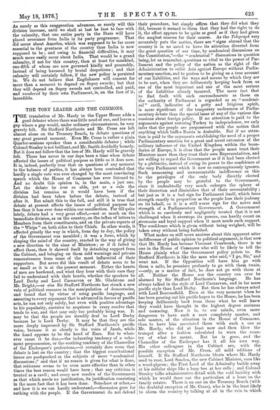TOPICS OF THE DAY.
THE COMING CONSTITUTIONAL DEBATE.
WHAT makes the Lords so meek ? If ever there was a question which they might have been expected to debate with some eagerness and energy, it is this of the propriety of introducing Sepoys into Europe without Parliamentary consent. They are not afraid of being misrepresented among their con- stituents. The possible frown of the Sovereign has no terrors for them. They include within their House half the legal strength of the country, the very men who, by experience, by knowledge of law, by study of constitutional history, are best qualified to enlighten both the Ministry and the people upon the exact bearings of the recent act. They know better than the Commons how to be discreet, what should be said and what avoided, how to warn the Government, and yet refrain from interfering with its negotiations. Moreover, they are supposed to be anxious to display their superiority in argument, to thirst for opportunity of high debate, to be resentful of the contempt which sometimes falls on them for the smallness of their contri- bution to the political education of the country. Yet after Lord Selborne had selected Thursday for the debate, and the Govern- ment had agreed to that day, the discussion is postponed, because, forsooth, the Commons had selected Monday, and it was better that the debates in both Houses should go on simultane- ously. Why is it better ? Why should the Peers, among whom sit Lord Beaconsfield, Lord Salisbury, Lord Cairns, and Lord Cranbrook, making, with Sir Stafford Northcote, the whole of the Committee which really governs, shrink from instructing the Commons ? The Lords' debates on the legal points, at all events, might have given the Commons invaluable guidance ; while for this once, we may be sure, the Peers are not" waiting for light from below." Nevertheless, Lord Selborne not only postpones the discussion, but intimates in advance that it will be purposeless. He will move no resolution and will take no division —will, in fact, do his duty as feebly as he possibly can. And Le Lords, who are supposed, if they understand anything, to understand Army matters and foreign politics, accept these arrangements for debate on a military movement vitally affecting our foreign posi- tion, like so many lambs. They agree that their ancient House shall be treated like a Debating Club, a body in which the members' powers of oratory may be displayed to an admiring audience, but which has no direct power of influencing the Ministry of the day. And they do this although they see more clearly than any one that the Ministry in their recent act have lowered that prerogative of Parliament, that right to be consulted and obeyed on all political matters, which alone makes of the House of Peers an important institution. What is that House if, when the Ministry make a grand innovation on ancient practice, the Lords are only entitled to talk, and cannot make their opinion felt effectively by the Executive ? Or what are the Peers in politics, if their House collectively is nothing ? Merely a number of very wealthy, middle-aged gentlemen, permitted' to talk aloud four nights in the week, but entirely without control over the progress of living and great affairs.
The debate in the Lords, under these circumstances' can scarcely be a good one for the country. Peers will not flock up, there will be none of the force which the prospect of a great division lends to all speakers of experience, and the audience which might have been gathered had Thursday been the day of debate will throng the galleries and passages of the Commons, where, unless some new incident interrupts the dis- cussion, it ought at least to be sincere. Two debaters may, it is true be absent from the fr9nt rank. Mr. Forster is still disabled from standing by his accident, and Mr. Bright will be too overwhelmed by the calamity which has excited sympathy for his suffering in every household in the kingdom. But we are happy to perceive that Lord Hartington has, for once in the course of these transactions, displayed some decision and adroitness as a leader in the House. That was a very clever stroke of Sir Stafford Northcote, who is becoming as ruse as the Due de Broglie, in treating Lord Hartington's motion as if it were identical with Mr. Chamberlain's, and a direct and general vote of censure, for he knew that if he could only give it that colour, the party behind him would vote to a man, if they voted down the Ten Commandments. If nothing else about the Tories is Russian, their discipline is, and we do not wonder that the public hardly knows the names of their Whips. Lord Hartington, however, was equal to the occasion, and his quiet but firm explanation replaced the question upon its true footing. He is not about, on this occasion, to raise the question of the general policy of the Government, or even of its wisdom in bringing Sepoys into Europe, but only of the Constitutional right of Parliament to be consulted first. The words of his resolution are mild in the extreme :—" That no forces may be raised or kept by the Crown in time of peace without the consent of Parliament, in any part of the dominions of the Crown, excepting only such forces as may be actually serving within her Majesty's Indian possessions." These words, how- ever, cover the whole ground, and unless the Ministry have a deliberate design of retaining power to carry on wars outside India without previous Parliamentary sanction, we scarcely see how the most bigoted Tory can object to them. They simply reaffirm a doctrine maintained for two centuries by the infinite majority of English statesmen of both parties,— that Parliament has the right to fix the number of troops which shall be employed by the Crown for any purpose whatso- ever, except the garrisoning and defence of her Majesty's Indian possessions, or rather Asiatic possessions, for Aden, Singapore,. and Hong Kong, although within "Charter limits," are not in India. This right has been delegated in India, with many other strictly Parliamentary rights, to the representatives of the Crown, but it has never been surrendered as regards the- Empire. Indeed it was reaffirmed by the Act which settled that all Indian troops employed outside "Charter limits ". should be paid by the United Kingdom, for the intention of that Act undoubtedly was that the money should be asked from Parliament previous to the moving of troops. Otherwise, the power of forbidding foreign enterprise by refusing supplies would have been taken away from Parliament altogether, and the Crown could have authorised of its own authority any war- it pleased, Parliament having only the privilege of refusing to pay the troops after they had started and been successful. Supposing, for example, as the extreme case, that the Crown ordered India to seize the Turkish Empire, and the Army charged with the work lived by requisitions, or out of the- foreign treasuries seized, the power of Parliament to prevent that great enterprise would be absolutely nil. Or to take a less impossible case,—her Majesty orders the seizure of Syria. by Indian troops. There is wealth enough in Syria to pay those troops. Where, on the apparent theory of the Ministry,. does the control of Parliament begin ? The movement of Indian troops, says Sir Stafford Northcote, need not be com- municated to Parliament. The right to declare war or peace- rests with her Majesty. Parliament need only be consulted when money is required, and the money required for the expe- dition is found in Syria. Clearly the Parliamentary control of the military power of the State, which is the very root of the Constitution, without which the " Empire " may become a veiled despotism, instead of a veiled Republic, would be reduced to an unreal fiction, only tolerated because the fiction slightly screened the actual disposers of power. The "pivot of power in such great enterprises would no longer be the House of Commons, but the Executive Government, which, if it attempted unpopular acts, would always have to be driven from power,. and not merely to be restricted as to those acts, as is now the practice.
It is no part of our duty, nor is it in our power, to anticipate the debates on Monday, but; there are two arguments in favour of Lord Hartington's motion which will not be employed in the Houses, but which ought to have the greatest weight with Tories. It is not their interest or their policy to invest the Crown with powers which may excite popular jealousy. Her Majesty throughout her protracted reign, has acted—mainly under the guidance of Whig Ministers—in such close adherence to Constitutional principle that popular jealousy has been laid asleep; but the life of the kingdom will not be synchronous with the Queen's reign, her successors may not be equally trusted, and every visible addition to the Prerogative will add to the strength of that Republican party which is as certain to spring up among us as Socialism is certain to spring up among the miserable. It is the highest duty of the Tory party, in their care for the Monarchy, to avoid all occasions for jealousy be- tween the people and the Crown, to keep the Monarchy under its veil of honour, and at least to appear to refer everything to the decision of Parliament. And the second argument is this. Every step taken by this Premier, and more especially this last step, tends to exaggerate excessively the position of India within the British Empire. Already the right to use her resources is a subject of division between parties, of fierce debate out-of-doors, of separations among statesmen who have always worked together. Already newspapers are asking if Britain is to be subordinated to India, or submerged in her. As surely as this exaggeration advances, so surely will this division increase, until we shall at last be face to face with the calamity, that one entire party in the State will have placed severance from India in its party programme. That did occur about America, which was supposed to be far more essential to the greatness of the country than India is now supposed to be ; and owing to financial difficulties, it may much more easily occur about India. That would be a grand calamity, if not for this country, then at least for mankind, one-fifth of whom are now governed kindly and peaceably, instead of being harassed by brutal despotisms ; and that calamity will certainly follow, if the new policy is persisted in. We do not believe that Englishmen will consent for more than a moment to depend on Sepoy swords ; but that they will depend on Sepoy swords not controlled, and paid, and numbered by their own Parliament, is, on the face of it, incredible.



































 Previous page
Previous page